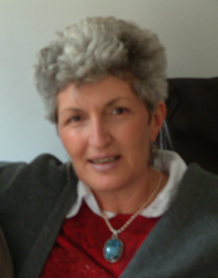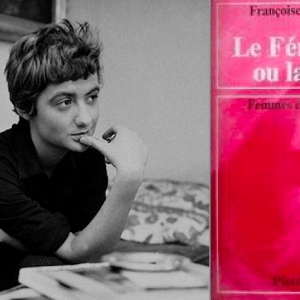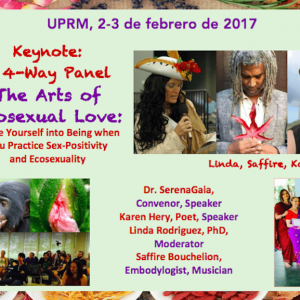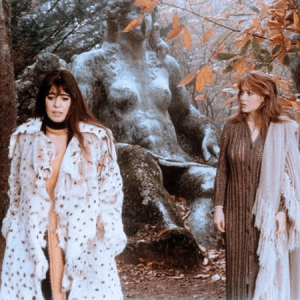The Old and the New:
Synergy and Medi(t)ation in Luigi Anderlini’s Works
by Serena Anderlini-D’Onofrio
an Introduction to A Lake for the Heart, poems by Luigi Anderlini
 |
| A Lake for the Heart |
The poems in the collection Il lago del cuore make a narrative, a story. Lago del cuore translates figuratively as the vastness, the emptiness of the heart, and as a call to a beloved, cherished lake. The story is about a man who is getting old, and knows he has had a life of plenitude, struggle, idealism, and compromise; a life that has fulfilled his wildest expectations and more, yet has exacted prices, and generated disappointments, disaffections, and lacerations. This poet goes through his memories, fantasies, dreams, and obsessions, to finally prepare for death. The last poem is about a woman, “lei,” (la morte) who comes and takes him to the “stair made of fog” (la scala di nebbia) that leads one “far, to eternal nothingness” (lontano, nel nulla eterno). He follows her, docile, an atheist’s anticipation of a soft, sweet passage to death. Even though in life my father had wanted to publish these pomes, it is no accident, in a way, that this edition is “posthumous.” But then the interesting part is that in the process of preparing this translation, numerous intriguing memories have been surging. These memories reveal a person that perhaps as a daughter I failed to see, a person who was a lot more similar to me spiritually and philosophically than the father I knew, somewhat imprisoned in his parental role.
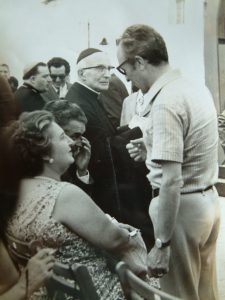 |
| Luigi Anderlini, public figure |
Two poems in the collection struck me as especially significant in this respect, for they made me see my father as a virtually polyamorous person whose deep spirituality verged on the pantheistic. Or perhaps this is my projection, for I have strong affinities with neo-pagan and polyamorist communities. Yet it’s not just that. For I am his daughter, and, while I lived an ocean and a continent away from him, the effort to interrogate the open questions of his life was an important force in leading me towards these movements. A teacher who entered the political arena as a socialist in his thirties, in his later life my father became a pacifist, and devoted his energies to peace causes well above the melée of partisan politics. But the open questions of his life were not resolved, including his choice of being an atheist regardless of his very deep spirituality, and his non-monogamous behavior, which he would not recognize as a deliberate choice, but rather experienced as a mistake. Related to these, was his ambivalent relationship to modernity and industrialization, which for his generation held the promise of curing poverty and pain.
Two poems in the collection inspire me to write of my dad in this way. The first is “Il lago” (“The Lake”), which is about the Lago di Bracciano, a volcanic lake in the vicinity of Rome, where he used to sail in his little boat, and which has long been used as a reservoir for the city’s water supply and is therefore free of motorboats. My dad used to have a little week-end house near this lake, and that’s where he was alone with himself and wrote his books and poems. The poet speaks to the lake, and in calling him tu, attributes a persona to this body of water, who was once a volcano and has now reincarnated in his current form. The second poem is “Donne” (Women), in which all the women who were his lovers at some point in his life, either long-term or just briefly, appear to him in a dream. These lovers appear to him as they were when he knew them, and the poet evokes his moments and stories with each of them. The poem ends with the dream of these lovers surrounding the poet together near his bed. “And now,” he says, “siete tutte qui . . . belle e impalpabili” (all of you are here . . . beautiful and impalpable, 32). This image of shared love and serenity dissipates the conventional rivalries of enforced monogamy and defeats traditional gender wars.
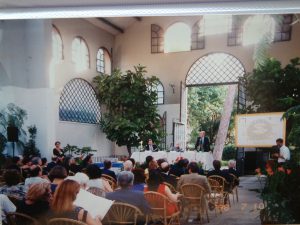 |
| Luigi Anderlini, peace activist |
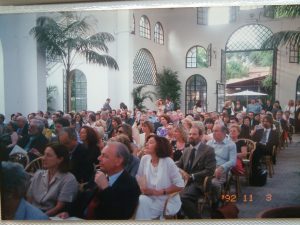 |
| Listening for Luigi Anderlini, peace activist |
These poems, and many others in the collection as well, speak to me of a virtually polyamorous person with pantheistic inclinations. His spirituality goes much beyond his proclaimed atheism; it sees the magic in nature; it recognizes the environment as a being with a life of its own; and it imagines the live creature of a lake as a volcano whose metamorphosis has generated the body of water that now lives in its crater. In the poet’s vision, the Earth is a live being, which disavows modernity’s belief in pure rationality and matter. This realm, this vision of the imagination, also makes room for a different kind of love, one in which love only begets more love. In life my father often insisted on the inevitability of modernity and its benefits. I remember teasing him that for him atheism was just another religion, as I was searching for an alternative to monotheism and a more pantheistic vision of the sacred. Yet his poems reveal his vision of life as a continuum. The poet is aware of his own mortality, announces it, and even describes his death. Throughout the collection, the metaphor he uses for life is prato, a grass lawn, a meadow people cross and meander in for a while, alone and together. His personal life was punctuated with passionate and multi-faceted relationships that contributed to making it vital and interesting. In Donne, as in a poly world, the poet wishes to have all his lovers with him at the same time, and loves them all in his memory. In life, my father did not quite manage to have things that way, yet the poet’s wish is that the women he loves choose to love each other in his death. In this dream of intimate peace, love expands from a monogamous to a more inclusive dimension, as in a neo-pagan tale.
To be continued . . . .
# # # # # # # # # # # # # # #
Il Vecchio e il Nuovo:
Sinergia e Medi(t)azione nelle opere di Luigi Anderlini
di Serena Anderlini con traduzione italiana di Joanna Capra
Le poesie che fanno parte della collezione Il lago del cuore formano una narrazione, una storia. Il Lago del cuore sta a significare la vastità, il vuoto del cuore, ed è un richiamo a un lago adorato e prediletto. La storia è quella di un uomo che sta invecchiando, e sa di aver vissuto una vita di pienezza, di lotta, di idealismo e di compromesso; una vita che ha esaudito le sue aspettative più inverosimili ed oltre, ma ha imposto dei prezzi generando delusioni, ostilità e lacerazioni. Il poeta riesamina le sue memorie, fantasie, sogni e ossessioni, per prepararsi infine alla morte. L’ultima poesia riguarda una donna, “lei” (la morte) che viene e lo porta alla “scala di nebbia” che conduce lontano, al nulla eterno. Lui la segue docile, un ateo che si prefigura un passaggio alla morte dolce e morbido. E benché mio padre in vita avesse voluto pubblicare queste poesie, in un certo senso non è un caso che questa edizione sia “postuma”. Ma la cosa interessante è che nel corso della preparazione di questa traduzione, si sono risvegliati in me dei ricordi intriganti. Ricordi che mettono in luce una persona che forse, in quanto figlia, non ho saputo vedere, una persona che era molto più simile a me spiritualmente e filosoficamente che non il padre che ho conosciuto, in qualche modo imprigionato nel suo ruolo di genitore.
Due poesie che fanno parte della collezione mi hanno colpito come particolarmente significative a questo proposito, poiché mi hanno fatto vedere mio padre come una persona virtualmente poli-amorosa la cui profonda spiritualità aveva del panteistico. O forse questa è una mia proiezione, poiche io ho molte affinita con le comunita neo-pagane e poliamoriste. Eppure non è proprio così. Perché sono sua figlia, e, quando vivevo un oceano e un continente lontano lui, lo sforzo di interrogare le questioni aperte della sua vita fu una spinta importante nel portarmi verso questi movimenti. Un insegnante entrato trentenne nell’arena politica come socialista, nella maturità avanzata diventò un pacifista e dedicò le sue energie alle cause della pace, ben al di sopra delle mischie di parte della politica. Ma alcune questioni della sua vita erano rimaste irrisolte, compresa la sua scelta di essere un ateo malgrado la sua profonda spiritualità e il suo comportamento non monogamo, che egli non fu capace di riconoscere come una scelta deliberata, piuttosto che come una semplice confusione o errore. A ciò si aggiungeva il suo rapporto ambivalente con la modernità e l’industrializzazione, che per la gente della sua generazione riservava la promessa di porre rimedio alla povertà e alla sofferenza.
Due poesie che fanno parte della collezione mi ispirano a scrivere di mio papà in questo modo. La prima è “Il Lago”, che riguarda il lago di Bracciano – un lago vulcanico nelle vicinanze di Roma – dove papà aveva l’abitudine di veleggiare con la sua piccola banca a vela – e che da lungo tempo è utilizzato come serbatoio per rifornire Roma di acqua e quindi è proibito alle barche a motore. Mio papà aveva allora una piccola casa da week-end vicino al lago, ed è lì che si ritrovava solo con sé stesso e che scriveva i suoi libri e le sue poesie. Il poeta parla al lago e, nel dargli del tu, fa una persona di questo specchio d’acqua, che un tempo era un vulcano e che si è ora reincarnato nella sua forma attuale. La seconda poesia è “Donne”, in cui tutte le donne che sono state sue amanti a un certo momento della sua vita, a lungo o per breve tempo, gli appaiono in sogno così come erano quando le aveva conosciute. Il poeta evoca i momenti e le storie con ognuna di loro. La poesia finisce con il sogno di queste amanti che circondano il letto del poeta, che dice: “E ora siete tutte qui, belle e impalpabili”. Questa immagine di amore sereno e condiviso dissipa le rivalità tipiche della monogamia forzata e sconfigge le tradizionali guerre fra i sessi.
Queste poesie, e molte altre della collezione, parlano a me di una persona capace di molteplici amori e con inclinazioni panteistiche. La sua spiritualità va molto oltre il suo proclamato ateismo; vede la magia nella natura; riconosce l’ambiente come un essere dotato di vita propria; e immagina la creatura viva di un lago come un vulcano, le cui metamorfosi hanno generato il corpo d’acqua che ora vive nel suo cratere. Nella visione del poeta, la Terra è un essere vivente che sconfessa il credo della modernità nella mera razionalità e materia. Inoltre, questo reame, questa visione dell’immaginazione, dà spazio a molti tipi di amore, in cui l’amore genera ulteriore amore. In vita mio padre spesso insisteva sulla inevitabilità della modernità e dei suoi benefici. Ricordo di averlo preso in giro, dicendogli che per lui l’ateismo era solo un’altra religione, mentre io ero in cerca di una alternativa al monoteismo e di una visione più panteistica del sacro. Eppure le sue poesie rivelano una visione in cui la vita è concepita come un continuum. Il poeta è consapevole della propria mortalità, la annuncia, e descrive persino la propria morte. Dalla prima all’ultima pagina della collezione di poesie, la metafora che usa per indicare la vita è un prato, uno spiazzo erboso, un campo che la gente attraversa o sul quale si aggira, sola o in compagnia. La sua vita personale era contrassegnata da rapporti appassionati e sfaccettati, che contribuivano a renderla vivace e interessante. In Donne – come in un mondo di plurali amori – il poeta desidera avere con se tutte le sue amanti allo stesso tempo e le ama tutte nel ricordo. In vita, mio padre non era riuscito del tutto a sistemare le cose in questo modo, eppure il desiderio del poeta è che, dopo la sua morte, le donne che amava scelgano di volersi bene. In questo sogno di intima pace, l’amore si espande da una dimensione monogama a una dimensione più inclusiva, come in un racconto neo-pagano.
# # # # # # # # # # # # # # # # # # # # #
Did you enjoy the Introduction? Let us know! Yours truly appreciates your attention. The comments box is open.
Posts will appear every Friday at 11:00 AM. Come back! And get your copy of A Lake for the Heart right away!
right away!
Stay tuned for more wonders.
Namaste,
Serena Anderlini-D’Onofrio, PhD
Gilf Gaia Extraordinaire
Author of Gaia and the New Politics of Love and many other books
Professor of Humanities
Professor of Humanities
University of Puerto Rico, Mayaguez
Follow us in the social media
Poly Planet GAIA Blog: http://polyplanet.blogspot.
Website: www.serenagaia.com
Become a Fan: www.facebook.com/GaiaBlessings
Author’s Page/Lists all books: http://www.amazon.com/-/e/
YouTube Uploaded Videos: http://www.youtube.com/
http://polyplanet.blogspot.com
